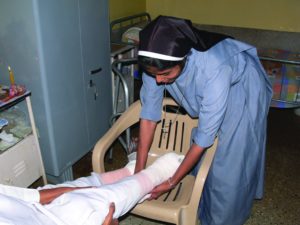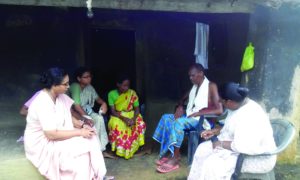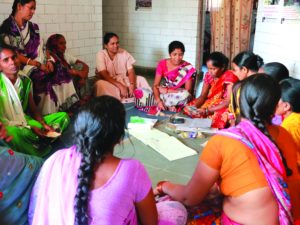Pope Francis, an example of closeness to the poor and concern for the least, has been inviting religious to “move to the peripheries,” and to choose the best persons for ministry among the poor. Are we doing it?
His father was the Governor General of Canada. He lived in Canada, England and France, and received a very good education. He was a member of the English Navy and later of the Canadian Navy. On completing his doctorate, he taught in a college. He could have had a successful career.
Visiting a psychiatric hospital near Paris, he was touched by the plight of intellectually disabled men. He gave up plans for a career, and decided to take in two of the men, and to share his life with them. Their names were Raphael and Philippe.
This was the beginning of a new life for all three. Jean Vanier—he is the one I am talking about—was not starting an institution, but sharing his life with two concrete human beings, Philippe and Raphael. The well-educated, well-placed Jean found: “Essentially, they wanted a friend. They were not very interested in my knowledge or my ability to do things, but rather they needed my heart and my being.”
Jean called for help, and a number of young people from different countries volunteered to assist him. This is how the movement now known as L’Arche (“The Ark”) started. There are 151 L’Arche communities on five continents, with some 5000 members. The volunteers, called “assistants,’ share the life of the “core members” (whom others consider handicapped).
In a talk to the students of Harvard University (the world’s richest and most prestigious educational institution), Jean spoke of a choice of “downward mobility.” He was in the Navy, and knew how to command, and how to have a good career. He left it to form community with persons whom others ignore, despise or avoid.
How many of us readily seek such “downward mobility”—to share our lives with the least, and do it with our whole heart and being?

Father Henri Nouwen, well-known priest-psychologist and bestselling author whose forty books are known to many of us, quit his university post and joined a L’Arche Community in Canada. He spent his last ten years ministering to persons for whom his erudition or fame or titles meant nothing. He did the humblest services for them—cleaning, bathing and feeding men who could not even say “Thank you” to him.
Examples Close to Us
This year, I got to know an Indian Sister who had been principal of a large school in one of our cities. She volunteered to work in a poorer country, and was assigned to East Timor, one of the world’s poorest nations, where even ordinary medicines are hard to come by. She looks and sounds happy. Asked about food, she told me, laughing, “Pumpkin in the morning, afternoon and night.” She sounds evidently delighted to live and work among the poor, in a setting far removed from her home or country.
Another Sister, a student of mine at Madras University, did a research paper on: “Do Women Religious Find Fulfilment?” One of the questions in her survey among women religious was: “Looking back, what do you feel most happy about?” Can you guess what makes most religious happy? Having worked for the poor. That came up as the most frequent answer. There is, evidently, a close link between happiness and commitment to the poor.
This was further confirmed in chats with a close friend of mine, a religious priest who had been principal of a famous English medium school in a city. “If I were to start my ministry now, and had the choice, I would work in a village school for poor children. Many of the rich kids who come to our city schools, simply pick up better English and improve their career prospects. We give them better skills to exploit the poor.”
Is your ministry increasing the opportunities of those who already have much, or opening doors of hope to those who have very little?
As a former Salesian who did extraordinary work among the poor as a layman, together with his wife, who had resigned her post as an associate professor and joined him in caring for the poor, asked me, “What is your celibacy about? Is it for expanding the opportunities of those who already have much, or for helping the poor to come up?” Good challenge.
Mahatma Gandhi had this criterion for checking the correctness of our decisions. It is a good principle for what we, in religious circles, call discernment:
“Whenever you are in doubt, or when the self becomes too much with you, apply the following test. Recall the face of the poorest and the weakest man [woman] whom you may have seen, and ask yourself, if the step you contemplate is going to be of any use to him [her]. Will he [she] gain anything by it? Will it restore him [her] to a control over his [her] own life and destiny? In other words, will it lead to swaraj [freedom] for the hungry and spiritually starving millions? Then you will find your doubts and your self melt away.”
Abhilasha Bhardwaj, a US-based Indian woman, shares on the web how this talisman helps her to avoid buying luxury clothes, which, after all, are just an effort to impress others, and use that money—or at least a part of it—to help the hungry or the homeless. She knows that her choice of simpler clothes will not remove misery from the world, but “just the wise decision of feeding the hungry for even 20% of this amount will definitely help many from sleepless-food-less nights.”
Isn’t this how we can build a more human world?
Do we, parents and educators, teach this to our children and students, both through exhortations, and still more by example?
Is this what the younger religious and seminarians will see in our older religious and priests?
God will provide!
When, as a young priest, Don Bosco was discerning what ministry he was called to, he thought of the missions; he considered becoming a Franciscan; his spiritual director dissuaded him. He was offered the chaplaincy in a home for girls run by a pious and rich lady from the aristocracy, the Marchioness Barolo. She was a good person, and cared for this young priest’s health and well-being. But she was frustrated at seeing him devote his energies more to the boys of the street. Finally, to persuade him, she gave him an ultimatum: You have to choose between your street boys and my girls. If you continue to spend all your time with those urchins, I will cut you off from financial help. You will be on your own.
Don Bosco told her: “The girls have you. These boys have no one. I will devote myself to helping these boys.”
As for the means to do it, he believed God would see to it.
And God provided in ways far beyond what the young priest could have foreseen.
If we forget that, and go only by human calculations, we will do very little. God has incredibly greater resources than what we can have or bring together. Our ministry towards the poor is based on this trust in God. These are God’s children, and, in caring for them, we are doing God’s work.
I have seen religious and priests do great things because of such trust in God. The Salesian works in Kerala—which was then a part of Madras Province—were started by Fr Francis Guezou, a French Salesian, to whom the provincial gave twenty Rupees! He and another Salesian priest reached Kochi, and—since it was raining—bought two umbrellas for that amount. A Communist who noticed that the two priests were not going out to eat, nor cooking, told them: “I am a Communist. I don’t like priests. But I do not like to see people starving. You can come to my house and eat.” That is how they started.
If you go to Yellagiri Hills (near Jolarpettai) today, you will see a huge centre that trains poor young people from the hills in advanced computer skills. (It has programmes for religious, too.) That, too, was started by the same Father Guezou. One priest gave him Rs 45, and another gave him a table and a bench. He started with that. He trusted God. He loved the poor.
I believe—and have seen—that commitment to the poor and trust in God are closely related. A diocesan priest, a former student of mine, comes to mind. He has done fantastic things—building up whole new parishes, churches and schools in places where there was nothing. You will not find his name on any building. Once, when he told me he wanted to put up a good building for the school for poor children in a slum, I told him, “You have not finished paying the bills for the church. How will you find the money?” His answer edified me: “This is God’s work. He will send us the money. But we should have big dreams.” Within a year, he was able to complete a new school building.
That is another lesson, by the way: People make out whether a priest or religious is after money or not. If someone is money-minded, people will not give that person money. If we are not after money, but dedicated to our ministry, people will give us all the money we need for doing good.
In Church settings, the real issue is not lack of money, but finding the right personnel.
Inspiring Models
Recently I met a Sister Doctor working in a poor village in Central India. Her consultation fees: Rs 50—for three months! That is, once a patient pays Rs 50, s/he does not pay anything for the subsequent visits for three months. “Our people are really poor,” she told me. “Most of them weigh only 35 to 40 kilos.”
There are a number of religious, especially women religious, who have done extraordinary medical work in our poorer villages. Their presence has been a life-and-death matter for many of our people, who cannot afford a trip to the city, nor the fees of corporate hospitals.
There are over 3500 medical centres run by the Catholic church all over India. They range from tiny dispensaries to huge and complex speciality hospitals. They differ in priorities, charges, facilities and target groups. The service many of them have done, and still do, for the poorer sections of our society has been exemplary. May many others, both within and outside the church, follow their example.
A Brahmin professor at one of our IITs told a friend why he became a Catholic. “I am not an emotional person,” he said. “I need convincing reasons for what I do. I was struck by something I read, namely, that 95 percent of the leprosaria in our country are run by the Catholic Church. I asked myself how and why a small community, fewer than 2 percent of our population, is able to do this. This is how I got interested in the Church.”

Meaningful Celibate Life
Leading a simple life and choosing poverty over riches, and service to the poor over serving the rich, is essential to a right understanding of celibacy. Celibacy is not simply a saying No to marriage and sex. It is the heart’s response to an invitation from God. We cannot live it meaningfully if we run after money, comfort, pleasure and power.
Henri Nouwen’s radical criticism of comfortable life-styles is both stern and practical. “A wealthy celibate,” he says, “is like a fat sprinter” [a contradiction in terms]. If we celibates find that our life-style is more comfortable than that of the people whom we serve, that means we have not taken our celibacy seriously. In fact, he adds, many lay people do not take our celibate life seriously, because they find our lives more comfortable when compared to their daily struggles. “Whenever the church is vital, it is poor.”
Nicholas Kristof, a reporter of the world’s most famous and influential newspaper, The New York Times, is not a Catholic. Writing from Sudan, where he went to report on the tragedies of that nation, he wrote movingly about the Catholic priests and nuns he met there.
“I came here to impoverished southern Sudan to write about Sudanese problems, not the Catholic Church’s. Yet once again, I am awed that so many of the selfless people serving the world’s neediest are lowly nuns and priests — notable not for the grandeur of their vestments but for the grandness of their compassion.…Overwhelmingly it’s at the grass roots that I find the great soul of the Catholic Church…
“I met Father Michael [an American missionary] in the remote village of Nyamlell, 150 miles from any paved road… He runs four schools for children who would otherwise go without an education, and his graduates score at the top of state-wide examinations. ..To keep his schools alive, he persevered through civil war, imprisonment and beatings, and a smorgasbord of disease… Father Michael may be the worst-dressed priest I’ve ever seen — and the noblest…
“There’s Father Mario Falconi, an Italian priest who refused to leave Rwanda during the genocide and bravely saved 3,000 people from being massacred. There’s Father Mario Benedetti, a 72-year-old Italian priest based in Congo who fled with his congregation when their town was attacked by a brutal militia. Now Father Mario lives side by side with his Congolese congregants in the squalor of a refugee camp in southern Sudan, struggling to get schooling for their children.”
After mentioning the deeply committed Sisters and priests he met in the poorest parts of the country, he adds:
“It’s because of brave souls like these that I honor the Catholic Church.”
We have a Pope who is a religious and who lives in a simple apartment at the Vatican. He lived among the poor as a bishop; he learnt from the poor. Immediately after his election as Pope, a Brazilian Cardinal sitting next to him whispered: “Do not forget the poor.” He certainly does not.
Joy and Fulfilment:
I asked Father Thomas Koshy, a Salesian priest known for his decades of work with the street children in Vijayawada, “How many boys and girls have you saved from the streets and helped to settle?”
His answer was a pleasant shock: “Some twenty-two to twenty-four thousand,” he said.
We, religious and priests, can make a huge, huge difference to a very large number of poor people—if we have our heart in the right place. For this, our God-search must be sincere, our priorities (mission-awareness) clear, and we must be free of hidden agendas, like the quest for power, money and comfort. Otherwise, we will waste our life and God-given energies on selfish pursuits. After all, we are put on this earth to increase the goodness in the world, aren’t we? We should not waste this precious gift called life on power games, gossip, social climbing and search for comfort.
Priests and religious who are committed to the poor, and lead a simple life themselves, are among the happiest people in the world. They do not see their life of service as heroic, or as a burden, but as a service of love offered cheerfully. They look happy, and they are. They have neither the time nor the interest to waste on who is doing what, who is getting transferred where, which scandal to spread, or what is there for lunch. No, life is too precious to be wasted on such trivialities or destructive games.
The saints show us how to combine a simple and committed life with great joy. Don Bosco would tell his boys—most of whom were poor, unrefined, uncouth, and unruly—“Here, in your midst, I am completely at home.” He would write to his boys telling them they had stolen his heart. When, at his deathbed, he was dictating his final letter, and came to the part for the boys, his voice broke. The thought of his boys moved him visibly, and he could not speak. This is love—real, palpable, effective, expressed in humble service. No wonder his second successor, Fr Paul Albera, who had been a boy under Don Bosco, could later write, “We were caught up in a current of love. We felt loved in a way we had never been loved before.”
The poor, as Mother Teresa used to say, need our love more than food. Don’t we all?
The best gift we give to the poor is not money or material food, but our genuine love.
If that love is real, the work is not a burden, nor the sacrifices of ministry something to complain about. For, as St. Augustine would say, “Where there is love, there is no fatigue; or, if there is fatigue, the fatigue itself is loved.”

Learning from the Poor
Archbishop Oscar Romero was a somewhat conservative clergyman when he was made bishop. What changed him was his growing realization of how the poor were treated—and how those who spoke for them were killed.
At the age of sixty, he went to school again—he started listening to the poor. They could come to the Bishop’s house and meet him. He would listen to them. He learnt from them. He decided to speak up in their defence.
I remember what a sister told me about her transfer from the city to a poor village. She had worked for years in their well-known city hospital, had VIP contacts, and was popular and influential. When her provincial wanted to send her to a village dispensary, she felt disappointed. Some of her influential friends in the city pleaded with her not to go; they wanted to ask the provincial not to transfer her.
But she went. Later, she would say, “I had worked only in our city hospital. This is the first time I am working in a village. I am learning a lot. Not only about the poverty and lack of facilities they suffer from, but about their faith and goodness. I would see a man taking his sick wife to the hospital on a cycle. They wanted not only medicine, but our prayers. I did not realize earlier that our prayers mean so much to people, especially when they are ill. My prayer life has improved after going to the village. I went there reluctantly, but I am so glad I got this chance.”
What would YOU do?
Here are two true incidents. If you wish, check which style resembles yours more.
Case One: A college student told his principal (a religious priest), “Father, I am going to discontinue. My father cannot afford to pay my fees. We have lots of problems at home.” “How much can your family pay?” “Only Rs 1000 a year.” “OK, pay that, and remain in college. Do not discontinue. We will find the money somehow.”
This priest—as well as his religious order—is giving a strong message: “We are here for you; we are not here for your money.”
Case Two: The driver in a religious house tells the rector: “At times, the Sisters where my daughter is studying are difficult.” “How?” “One month, I was late in paying the fee. My child is asthmatic; a sister made her stand outside in the cold.”
The message here seems to be: “We are here for your money.” Is this how we train our religious and priests?
If we run (or start) a school or college, do we start it in a poor area to make education accessible to the deprived, or in a richer area, where we are more certain of making money? Do we see education mostly as a means to empower the marginalized, or as a source of income? Do we train (and treat) those of us who get teaching posts as persons meant for a mission or more as persons bringing in a salary?
My “job” as a Salesian is not to bring money to the Salesian Congregation, but to bring God’s love to the young, especially the poor. This is what distinguishes a school or other work run by the Church as opposed to an institution run by a business group. Profits are the main concern for them; service, especially of the least, should be our main concern. If we are not careful, what starts as a mission of service can end up as a business.

Life-Style and Formation
Two things influence us more than the Pope’s invitation or example—the general life-style of the members of the order, and how formation is imparted.
Life-style: A religious who had been a superior for years, told me: “This is the first time I am taking an autoric. What I am used to is this: Ten minutes before I need to go anywhere, the car and driver are ready and waiting.” If we get used to comfort and luxury, we will easily forget the poor, and act and talk and take decisions like the rich. And we will enjoy—even seek—the company of the rich more than of the poor.
Formation: Formators must be men and women who lead a simple life, and who have had some experience of working with the poor. Clever theories and fancy degrees do not make someone a good formator. The formees study the formators closely. If what they see is inspiring, the formees will listen and become better persons. If not, they will become cynical, and think: “I have to obey now; later I can have anything I want, and do what I like.”
Balwant Singh Dalwani, a Sikh diplomat who worked in the Indian Foreign Service, resigned early, and worked among leprosy patients in rural Maharashtra. At an inter-religious conference he recited a prayer that touched me deeply. He said: “When I have found Thee, there is no ‘mine’ and ‘not mine’; everybody is mine.”
May we, too, be deeply transformed by our meeting with God, and see everyone, especially the poor, as truly “our own.”
If they are our own, and their needs become our core concerns, then working for them, living like them, and making them our priority will come natural to us. We will have the “smell of the sheep,” because it is among them we spend most time.
We will allot to their service the most gifted among us—not the “leftovers” nor the troublesome ones.
Love will make our work enjoyable, and we will go through the world as joyful witnesses to God’s incredible, tender, never-failing love for each of us.
May our faith in Christ help us to love the least and give them our best.

To subscribe to the magazine Contact Us





